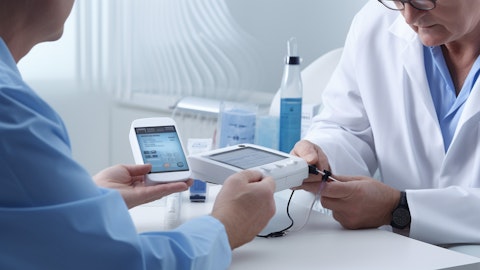We recently compiled a list of the 7 Best Debt Free Stocks To Buy. In this article, we are going to take a look at where Cassava Sciences Inc (NASDAQ:SAVA) stands against the other debt free stocks.
Debt has always been the fuel driving many companies in the equity markets. Access to cheap capital when interest rates were at all-time lows of 0.25% saw most companies in the S&P 500 bolster their balance sheet to finance various operations, including research and development and recurrent expenditure.
However, during the Federal Reserve’s meeting on July 30-31, 2024, interest rates were kept unchanged at 5.25% – 5.50%. Officials noted that inflation is nearing its target, potentially allowing for future rate cuts. “The Committee judges that the risks to achieving its employment and inflation goals continue to move into better balance,” the Federal Open Market Committee stated. Chair Jerome Powell mentioned that a rate cut could be possible in September if inflation continues to ease.
READ ALSO: 15 Most Feared Activist Hedge Funds and 10 Highest Paying Monthly Dividend Stocks.
To combat inflation, the rate was raised 11 times between March 2022 and July 2023. Amy Hubble, principal investment advisor with Radix Financial, noted, “If they cut 0.25% at a time, that’s 12 cuts over several years. So this isn’t something that’s going to happen quickly.”
The interest rates companies pay for business loans in the US vary widely based on factors like the type of loan, the lender, and the company’s creditworthiness. As of 2024, average interest rates for small business term loans range from 7.85% for fixed-rate loans to 8.79% for variable-rate loans. Online business loans can have rates from 9% to 75%, while SBA loans range from 11.50% to 16.50%. Rates can be significantly higher for businesses with poor credit.
Nevertheless, one thing that became clear after the 2008 financial crisis is that large debt loads can weigh on a company, leading to severe implications. Amid the high interest rate environment, with the US Federal Reserve hiking interest rates last year to between 5.25% and 5.50% to try and tame inflation, companies failing to meet their debt obligation increased to 153 from 85 the previous year.
Big businesses could be in trouble as the Federal Reserve reports a staggering $13.7 trillion in debt in corporate America. S&P indicates that the amount of debt companies hold has increased by 18.3% since 2020, largely due to firms taking advantage of the Federal Reserve’s move to reduce interest rates at the beginning of the pandemic.
While most people might argue that companies with zero debt are not optimizing their capital structures for growth, that’s only sometimes the case. The best debt-free stocks to buy are companies with solid balance sheets owing to their strong free cash flow generation capabilities. It also affirms the resiliency of the company’s core business to generate significant cash flow, therefore fending off the need to take up debt.
However, taking on debt is only acceptable if the business generates profits and adopts strict protocols to prevent defaulting on payments. If major corporations default on their obligations, it might lead to bankruptcy.
In the US, concerns about impending recession and an uptick in the benchmark rate resulting in higher interest payments have compelled businesses to reduce their debt levels significantly. Consequently, some companies have stood their ground, operating within their means by relying on their free cash flow instead of taking up debt.
In this case, some companies have a history of operating with low or no debt. Instead of taking up debt, they hold cash and short-term highly liquid assets to make acquisitions and finance day-to-day operations.
Therefore, the best debt-free stocks to buy belong to firms that have successfully met their financial responsibilities, making them intriguing investments for individuals seeking stability. A debt-free position indicates lower financial risk and increased financial flexibility for the organization.
The debt-to-equity ratio is a popular financial metric used to measure a company’s financial leverage. It is arrived at by dividing total liabilities by shareholders’ equity. Companies with high debt-to-equity ratios relative to the industry’s average imply they rely more on debt to finance their operations, which can be risky.
Generally, the best debt-to-equity ratio of any company looking to manage its debt load is 1 to 1.5. However, the appropriate ratio depends on various factors, including the company’s growth stage and industry sector.
In addition to the debt-to-equity ratio, it is essential to evaluate the enterprise value when analyzing the best debt-free stocks to buy. Enterprise value is arrived at by considering both the current share price (market capitalization) and the cost to pay off debt (net debt or debt minus cash)
Companies in a solid financial position tend to have a much lower enterprise value than market cap, i.e. more net cash.
Our Methodology
We meticulously reviewed the top 100 stocks from the Yahoo screener, selecting those with zero or very little debt. We compared their enterprise value (EV) to their market capitalization. We then ranked the best debt-free stocks in ascending order of their potential upside, as of August 16.
At Insider Monkey, we are obsessed with the stocks that hedge funds pile into. The reason is simple: our research has shown that we can outperform the market by imitating the top stock picks of the best hedge funds. Our quarterly newsletter’s strategy selects 14 small-cap and large-cap stocks every quarter and has returned 275% since May 2014, beating its benchmark by 150 percentage points (see more details here).

A scientist in a lab coat working with a microscope in a research laboratory.
Cassava Sciences Inc (NASDAQ:SAVA)
Market Cap as of 16/08/2024: $1.36 Billion
Enterprise Value: $1.24 Billion
Upside Potential: 617.16%
Cassava Sciences Inc (NASDAQ:SAVA) is one of the best debt-free stocks to buy to gain exposure in the healthcare sector. It operates as a clinical-stage biotechnology company developing drugs for neurodegenerative diseases. Its lead product is Simufilam, a small molecule drug for detecting Alzheimer’s disease.
While Cassava Sciences Inc (NASDAQ:SAVA) is flat for the year, it more than doubled in value in June before experiencing a deep pullback. The stock rallied by over 30% after Chief Executive Officer Rick Barry issued a positive open letter signaling positive phase 2 results for its experimental Alzheimer’s disease drug Simufilam.
The deep pullback came on Hoau-Yan Wang, a former consultant to Cassava Sciences Inc (NASDAQ:SAVA), being indicted on fraud-related applications made on the experimental drug. The company has already refuted any wrongdoing.
Cassava Sciences Inc.’s (NASDAQ:SAVA) debt level stood at about $14.19 million as of the end of last year. The company also boasts an enterprise value of $935.78 million with a market cap of $1.06 billion.
Analysts on Wall Street rate Cassava Sciences Inc (NASDAQ:SAVA) as a ‘Moderate Buy’ with a $107 price target, implying a 617.16%upside potential from current levels. Insider Monkey database indicates that 6 out of the 920 hedge funds tracked held stakes in the company as of the end of Q1 2024.
Overall SAVA ranks 1st on our list of the best debt free stocks. While we acknowledge the potential of SAVA as an investment, our conviction lies in the belief that AI stocks hold greater promise for delivering higher returns and doing so within a shorter timeframe. If you are looking for an A.I. stock that is more promising than SAVA check out our report about the cheapest AI stock.
READ NEXT: $30 Trillion Opportunity: 15 Best Humanoid Robot Stocks to Buy According to Morgan Stanley and Jim Cramer Says NVIDIA ‘Has Become A Wasteland’.
Disclosure: None. This article is originally published at Insider Monkey.





